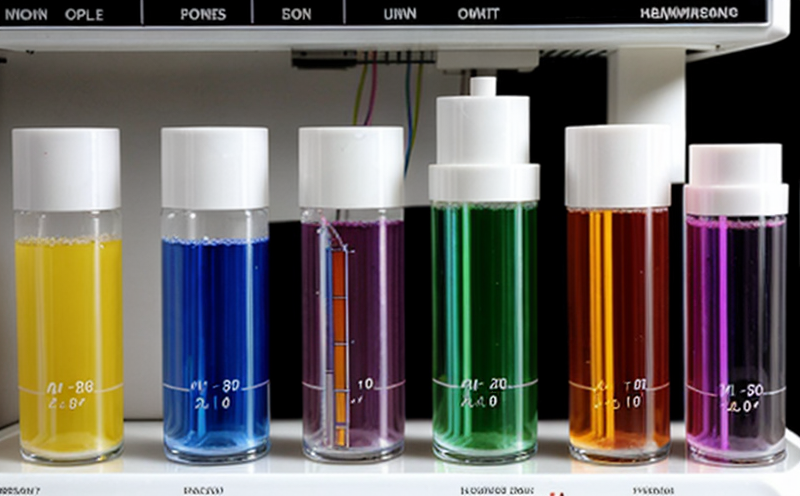ASTM D5307 Hydrocarbon Testing in Fuels by GC
The ASTM D5307 standard provides a method for determining the distribution of hydrocarbons in petroleum products, including gasoline and diesel fuels. This technique is crucial for ensuring fuel quality compliance with industry standards and regulations. The primary goal is to assess the boiling range distribution of hydrocarbons present within the fuel sample.
The testing process involves the use of a gas chromatograph to separate and quantify the individual components based on their boiling points. This method allows laboratories like Eurolab to identify if there are any deviations from expected ranges, which could indicate contamination or substandard production processes.
For quality managers and compliance officers responsible for ensuring fuel standards across various sectors such as aviation, automotive, and marine industries, this test is essential in maintaining operational efficiency while adhering strictly to regulatory requirements. It helps them monitor the performance of their supply chains by validating that received batches meet specified criteria before distribution.
R&D engineers also benefit from ASTM D5307 testing when developing new formulations or modifying existing recipes for improved fuel characteristics. By analyzing the hydrocarbon composition, they can fine-tune additives and blending ratios to achieve optimal properties tailored specifically towards target markets.
In terms of procurement activities, this service ensures that purchasing decisions are based on reliable data rather than assumptions. Suppliers providing fuels must provide evidence demonstrating compliance with relevant specifications; non-compliance may result in penalties or loss of business opportunities for those failing to meet stringent requirements set forth by governing bodies.
The accuracy and precision provided by Eurolab through ASTM D5307 testing contribute significantly towards enhancing the overall reliability of fuel products available on the market today. With our expertise combined with state-of-the-art equipment, we offer clients peace of mind knowing their needs are being addressed comprehensively.
Scope and Methodology
| Sample Preparation | Analytical Procedure | Data Interpretation |
|---|---|---|
| Properly collect and preserve fuel samples according to ASTM guidelines. | Inject prepared sample into gas chromatograph where separation occurs based on boiling point differences between various hydrocarbon fractions. | Analyze resulting peak patterns against known reference standards to determine precise concentrations of different hydrocarbon groups within the tested batch. |
| Ensure proper labeling and documentation throughout collection process. | Use software to automate data acquisition and presentation in graphical format. | Compare obtained results with established limits specified by relevant authorities or company policies. |
This approach ensures consistent, accurate measurements that can be relied upon for decision-making purposes. Proper sample preparation is key as it directly impacts the integrity of subsequent analysis steps. Analytical procedures must follow strict protocols to minimize potential sources of error. Data interpretation requires experienced personnel who understand both theoretical principles and practical applications.
Eurolab Advantages
At Eurolab, we pride ourselves on delivering exceptional services that meet or exceed expectations set by our clients across diverse industries. Our commitment to excellence is reflected in the way we approach each task - from initial consultation through final report delivery.
- Experienced Staff: Drawn from backgrounds in chemical engineering and analytical chemistry, our team members bring extensive experience working with complex samples requiring advanced techniques such as those utilized in ASTM D5307 testing.
- State-of-the-Art Equipment: Leveraging cutting-edge technology ensures accurate results every time. From sample preparation systems to sophisticated chromatographs capable of detecting minute quantities, our instruments are designed specifically for high-precision applications.
- Comprehensive Reporting: Understanding that clear communication is vital in conveying findings effectively, we provide detailed reports complete with charts and graphs illustrating key points discussed during the testing process. This helps stakeholders make informed decisions quickly without needing additional interpretation.
- Regulatory Compliance: Stay ahead of changing regulations by partnering with a lab recognized for its adherence to international standards including ISO/IEC 17025:2017 and ASTM D5307 itself. We ensure all tests conducted comply with these stringent requirements.
By choosing Eurolab, you gain access to unparalleled expertise supported by robust infrastructure ensuring top-notch performance consistently delivered across multiple projects.
Quality and Reliability Assurance
- Dedicated Quality Control Personnel: Our QC team works closely with analysts throughout the entire testing cycle, performing regular checks to catch any discrepancies early on. This proactive approach helps maintain consistency and accuracy across all projects.
- Continuous Training Programs: Regular training sessions keep our staff updated on latest developments within their respective fields. Keeping abreast of new methodologies allows Eurolab to stay ahead in providing superior services tailored specifically towards evolving needs.
| Quality Check Points | Action Taken if Deviations Occur |
|---|---|
| Initial Sample Inspection | Reject batch and notify client immediately. |
| Analytical Stage Review | Re-run tests or request additional samples for reanalysis. |
| Final Reporting Stage | Conduct internal audits to verify calculations, interpretations before issuing final reports. |
These measures reflect our dedication to delivering reliable results consistently. Our robust quality assurance framework guarantees that even under challenging conditions, we maintain high standards of performance and reliability.





